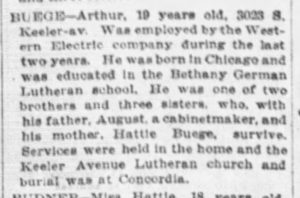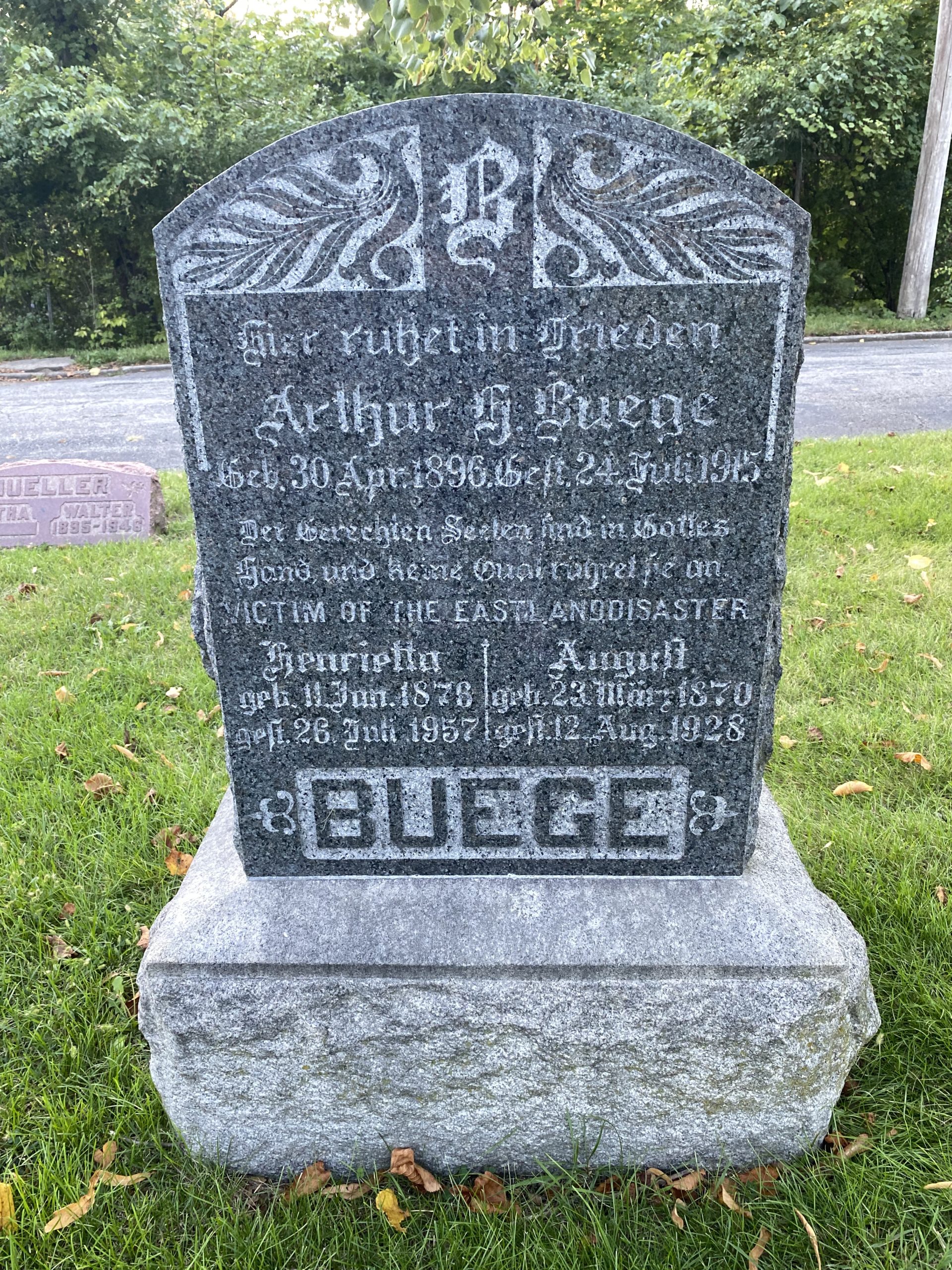30 April 1896 – 24 July 1915
The Eastland, one of five chartered excursion boats meant to ferry employees, their families and friends from Chicago over to the Michigan City shore for the annual Western Electric Company picnic, keeled over into the Chicago River while still at dock, trapping hundreds inside its hull and leading to the deaths of 844 of the 2,500 passengers aboard at the time of the incident which became known as The Eastland Disaster.
Arthur was the oldest son of German immigrants August and Henrietta “Hattie” (Plahm) Buege. His parents had both came to the US as small children with their families, and he grew up with his maternal grandparents living very nearby. By 1902, Hattie was the only surviving child of her parents, and when her mother was widowed in 1908, she moved in with the Bueges and lived with them for the rest of her life.
Arthur’s father was a carpenter and cabinetmaker, and the family seems to have done well by the standards of the time, losing only one child of six born, the children being Arthur, his nearest-in-age little sister Myrtle (who was the one who died in childhood), Edna, Martha, Elmer, and youngest Clara.
For many years, the family lived on Cortez Avenue, but at some point before his death, they moved to Keeler Av which is where the family resided when Arthur died.

At five years older than his nearest-in-age sibling, Arthur was the only one of them in the workforce at the time of his death. He had been with Western Electric for 1 year and 8 months, making $16/week which was good money for his age and tenure at the company. The family received $165 for the funeral bill plus $60 in relief money from Western Electric which might indicate the family was going through a rough patch or that his wages were substantially contributing to the family upkeep as, in my research at least, it seems to have been less likely for a family with an employed father to receive relief funds from either WE or the Red Cross.
Updated: The Red Cross report (with thanks to EDHS for providing the citation information) sheds some light on the family’s situation at the time of Arthur’s death, and it’s a sad story. Arthur had been taking care of his family as the principal wage earner due to his father’s alcoholism. Even more tragically, after Arthur’s death August became (or became more) abusive to the point where Hattie reached out to the Red Cross for additional support. The Eastland Fund agreed to provide her with $100 outright, and then paid a stipend of $45 per month for an additional 18 months, for a total of $910 which was a very substantial payout for the fund.
I did not find a probate document for him at all, though the more I’ve learned about the aftermath of the disaster, I’m not sure what all happened even for those for whom I found such paperwork. Large payouts do not seem to have been the norm and while a generous relief payment from WE or the Red Cross could be very helpful to the surviving families, it doesn’t appear anyone received the kind of financial boost implied by the $10K and $20K boilerplate estate “estimates” on the extant probate records, and definitely they did not receive the liability payments they deserved. In some cases, there may have been some insurance settlements, but those were likely individual coverage situations. Updated: The Red Cross report also listed a $1,000 insurance payout to the family.
Arthur’s family went on without him, staying on at the Keeler Av address through 1920 then moving to Berwyn prior to 1928. We know this, sadly, because that’s the address listed on papa August’s death record. That house is still there and very cute, though its early-century exterior features have been stucco’d over.
In 1920, Edna married and in 1922 she had a son whom she named after her big brother. Tragically, Arthur Jr also died at age 19, passing away in 1941.
Martha married in 1921 and had one son (her only child), prior to 1930. On that census, Hattie and her youngest two children, Elmer and Clara, were still living in the Berwyn house which she indicated was owned outright, but by 1940, Hattie had moved in with Martha and her husband and young son. Sadly, Martha’s first husband died just six years later, and by 1950, Hattie had moved in with daughter Edna who listed herself as separated. Edna and her husband died in the early 1980s (Edna at the age of 84) and were buried together with their son Arthur, so either it was an amicable separation or they reconciled at some point after 1950. Edna had one surviving daughter.
Arthur’s brother Elmer married in 1944, and had one daughter. He died at 65 years old in 1971 and was buried at Irving Park Cemetery. Martha remarried in 1956 but had no more children. She died at age 92 and was buried with her second husband in Wheeling, Illinois.
It’s unclear when Clara married, but it was between 1930 and 1940 to 15-years-older George Rennhack. George was a tariff examiner for the ICC and prominent enough that his death was written up as a news item. By 1940, they were living in Washington, DC where George worked, though they had no children yet. I couldn’t find them on the 1950 census, but by the time of George’s death in 1952, they had three children. Clara never remarried and died at the age of 88. She and George are buried at Concordia.
Hattie died in 1957 at age 81 and was buried with August and Arthur.
RIP Bueges
Please visit my Instagram for any questions or comments on this post!
Thank you to the Eastland Disaster Historical Society for providing additional documentation in support of this project.
